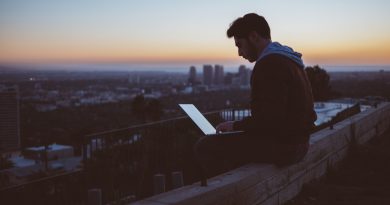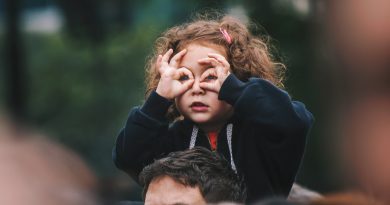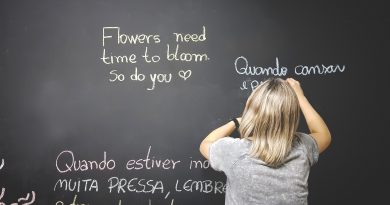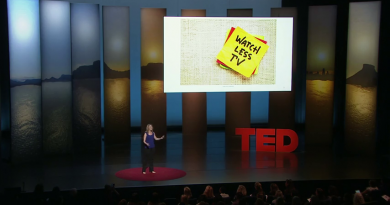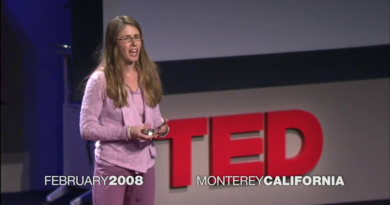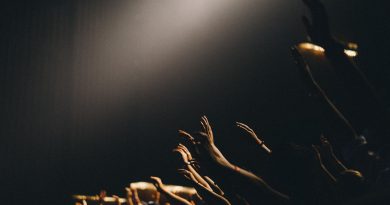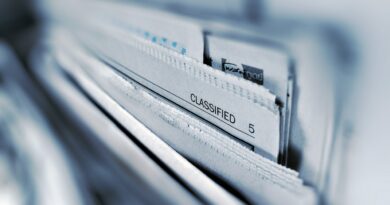Crédito da Imagem: Damir Spanic on Unsplash
Você pode estudar para um teste enquanto dorme? Nossos intrépidos neurocientistas tentam melhorar a memória fazendo experimentos em voluntários enquanto dormem. Você ficará surpreso com os resultados. (Fonte: TED.COM).
| Audio | |
|---|---|
Normal | Slow |
| English Transcript | Tradução |
| Greg Gage: Who wouldn't love acing a geography exam, remembering all the locations of the countries on a map or avoiding embarrassing situations of suddenly forgetting the person's name standing right in front of you. It turns out that memory, like other muscles in the body, can be strengthened and enhanced. But instead of practicing with flash cards, there may be an interesting way that we can hack our memory while we sleep. | Greg Gage: Quem não quer tirar dez na prova de geografia, lembrar todos os locais dos países em um mapa ou evitar situações embaraçosas, como esquecer, de repente, o nome da pessoa bem na sua frente. Acontece que a memória, como outros músculos do corpo, pode ser fortalecida e aprimorada. Mas, em vez de praticar com cartões, pode haver um modo interessante de manipular nossa memória enquanto dormimos. |
| Why do we sleep? This has been a question asked since the early days of civilization. And while we may not know the exact answer, there are a number of really good theories about why we need it. Sleep is when the brain transfers short-term memories experienced throughout the day into long-term memories. This process is called memory consolidation, and it's the memory consolidation theory that has scientists wondering if we can enhance certain memories over others. There was a paper recently in the journal "Science" by Ken Paller and his colleagues at Northwestern that seemed to show that this may be true, and that piqued our curiosity. Joud has been working on a DIY version of this task to see if we can improve memories through the use of sound in sleep. So Joud, how do you test if we can improve our memories with sleep? | Por que dormimos? Temos feito essa pergunta desde os primeiros dias da civilização. Embora possamos não saber a resposta exata, há teorias muito boas sobre o motivo de precisarmos dela. Sono é quando o cérebro transfere memórias de curto prazo vivenciadas ao longo do dia para memórias de longo prazo. O nome desse processo é consolidação da memória, e a teoria dessa consolidação faz os cientistas se perguntarem se podemos melhorar certas memórias em detrimento de outras. Recentemente, um artigo na revista "Science", de Ken Paller e seus colegas da Northwestern, parecia mostrar que isso pode ser verdade, o que despertou nossa curiosidade. Joud trabalha numa versão faça-você-mesmo dessa tarefa para ver se podemos melhorar a memória usando o som durante o sono. Joud, como você testa se podemos melhorar nossa memória com o sono? |
| Joud Mar'i: We need a human subject. | Joud Mar'i: Precisamos de uma pessoa. |
| [Step 1: Play a game] We have a memory game that we have on an iPad, and then we make our subject play this game and remember the images and where they appear on the screen. | [Etapa um: disputar um jogo] Temos um jogo de memória em um iPad e, então, fazemos a pessoa jogar e se lembrar das imagens e sua posição na tela. |
| GG: So this is like a memory game you used to play as a child, which picture was where. And we tie each picture with a sound that represents it. | GG: Parece um jogo de memória da infância de adivinhar a posição de imagens. Associamos cada imagem a um som que a representa. |
| JM: So, if you can see a picture of a car, for example, and you would hear the car engine. | JM: Você pode ver a imagem de um carro, por exemplo, e ouvir o motor do carro. |
| GG: Just before you go to sleep we're going to test you. We're going to see how well you remember where the pictures are. Every time you see the picture, you're going to hear the sound. And now comes the experiment. You're going to go take a nap. [Step 2: Take a nap] And while you're sleeping, we're going to be recording your EEG. | GG: Pouco antes de você dormir, iremos testá-lo. Vamos ver o quanto você se lembra da posição das imagens. Toda vez que você vir uma imagem, ouvirá o som. E agora vem o experimento. Você vai tirar uma soneca. [Etapa dois: soneca] Enquanto você dorme, registraremos seu eletroencefalograma. |
| JM: And then we wait for them to go into what's called the slow-wave sleep, which is the deepest phase of your sleep where it's really hard for you to wake up. | JM: Depois esperaremos você entrar no chamado sono de ondas lentas, que é a fase mais profunda de seu sono, quando é muito difícil você acordar. |
| GG: OK, pause. So, here's some information on sleep. There are four stages: we have lighter stages of sleep and REM, but what we're interested in is called slow-wave sleep. And it gets its name from the electrical signals called Delta waves that we record from the brain. This is the part of sleep where scientists believe that memory consolidation can happen. In this deep period of sleep, we're going to do something that you don't know we're going to do. | GG: Certo, uma pausa. Eis algumas informações sobre o sono. Há quatro estágios: temos estágios mais leves de sono e MRO, mas estamos interessados no sono de ondas lentas. Ele recebe esse nome dos sinais elétricos chamados ondas delta que registramos a partir do cérebro. Essa é a parte do sono em que cientistas creem que pode ocorrer consolidação da memória. Nesse período profundo de sono, faremos algo que você não sabe que iremos fazer. |
| JM: Here's where the tricky part comes, and we start playing our cues. | JM: É quando vem a parte complicada, e começamos a tocar nossas dicas. |
| GG: Do you play all the cues? | GG: Você toca todas as dicas? |
| JM: No. We only want to play half of them to see if there's a difference. | JM: Não, só queremos tocar metade delas para ver se há alguma diferença. |
| GG: So your hypothesis is the one that they were listening to while they're sleeping they're going to do better at. | GG: Você supõe que é na dica que a pessoa ouvia enquanto estava dormindo que ela se sairá melhor ao acordar. |
| JM: Yes, exactly. | JM: Sim, exatamente. |
| GG: When you wake back up and play the game again, do you do better or worse than before a nap? What we found is that if we played you a cue during your sleep, for example, a car -- You would remember the position of that car when you woke back up again. But if we didn't play you the cue during the sleep, for example, a guitar, you'd be less likely to remember that guitar when you woke up. The memories that were cued they remembered better than the ones they weren't, even though they don't remember hearing those sounds? | GG: Será que, ao acordar e disputar o jogo novamente, você se sairá melhor ou pior do que antes da soneca? Descobrimos que, se tocássemos uma dica para você durante o sono, por exemplo, de um carro, você se lembraria da posição daquele carro quando voltasse a acordar. Mas, se não tocássemos a dica durante o sono, por exemplo, de um violão, seria menos provável que você se lembrasse desse violão ao acordar. Será que as pessoas se lembram melhor das memórias com dica do que das sem dica, mesmo que não se lembrem de ouvir esses sons? |
| JM: Yes, we ask them. | JM: Sim, exatamente. |
| GG: We know they're sleeping, they can't hear it, they wake up, they do better on those than the ones you didn't play. | GG: Sabe que estão dormindo, não podem ouvir, acordam, se saem melhor naquelas dicas do que nas que você não tocou. |
| GG: That's amazing. | GG: Isso é incrível. |
| JM: It's like magic. | JM: É como mágica. |
| GG: Joud ran this experiment on 12 people and the results were significant. It's not that you remember things better; it's that you forget them less. I was a huge skeptic when I first heard that you could do better at a memory test just by playing sounds during sleep. But we replicated these experiments. The facts and memories we collect throughout the day are very fragile, and they are easily lost and forgotten. But by reactivating them during sleep, even without us being aware, it seems like we could make them more stable and less prone to forgetting. That's pretty incredible. Our brains are still active even when we're not. So if you're like me and a bit forgetful, perhaps a solution is a pair of headphones and a soft couch. | GG: Joud fez o experimento com 12 pessoas, com resultados significativos. Não é que você se lembra melhor das coisas; é que você se esquece menos. Eu estava bem cético quando ouvi que você poderia se sair melhor num teste de memória só tocando sons durante o sono. Mas replicamos esses experimentos. Os fatos e as memórias que coletamos ao longo do dia são muito frágeis e são facilmente perdidos e esquecidos, mas, reativando-os durante o sono, mesmo sem estarmos conscientes, parece que os tornamos mais estáveis e menos propensos a esquecer. Isso é incrível. O cérebro ainda está ativo, mesmo quando não estamos. Se você for como eu e um pouco esquecido, talvez uma solução seja fones de ouvido e um sofá macio. |
Contagem de palavras
A tabela abaixo exibe as palavras encontradas neste vídeo bem como o número de vezes em que aparecem.
Veja também: Para que serve esta tabela?
| Freq. | Palavra | Freq. | Palavra | Freq. | Palavra |
|---|---|---|---|---|---|
| 36 | the | 27 | a | 26 | we |
| 24 | and | 23 | you | 19 | to |
| 19 | that | 17 | sleep | 16 | of |
| 10 | do | 9 | this | 9 | they |
| 9 | is | 9 | gg | 8 | play |
| 8 | memory | 8 | if | 8 | going |
| 7 | we're | 7 | on | 7 | memories |
| 7 | jm | 7 | can | 6 | where |
| 6 | when | 6 | them | 6 | so |
| 6 | remember | 6 | our | 6 | it |
| 6 | in | 6 | better | 6 | are |
| 5 | up | 5 | see | 5 | like |
| 5 | it's | 5 | game | 5 | for |
| 5 | but | 5 | be | 4 | you're |
| 4 | your | 4 | while | 4 | there |
| 4 | picture | 4 | joud | 4 | during |
| 4 | car | 4 | called | 3 | with |
| 3 | were | 3 | was | 3 | wake |
| 3 | they're | 3 | than | 3 | test |
| 3 | sound | 3 | sleeping | 3 | not |
| 3 | nap | 3 | may | 3 | less |
| 3 | know | 3 | hear | 3 | have |
| 3 | has | 3 | go | 3 | example |
| 3 | even | 3 | consolidation | 3 | by |
| 3 | at | 2 | yes | 2 | would |
| 2 | woke | 2 | why | 2 | which |
| 2 | what | 2 | wave | 2 | throughout |
| 2 | those | 2 | then | 2 | that's |
| 2 | term | 2 | take | 2 | subject |
| 2 | step | 2 | stages | 2 | sounds |
| 2 | slow | 2 | scientists | 2 | really |
| 2 | playing | 2 | part | 2 | or |
| 2 | ones | 2 | need | 2 | name |
| 2 | make | 2 | just | 2 | into |
| 2 | improve | 2 | I | 2 | how |
| 2 | here's | 2 | guitar | 2 | from |
| 2 | forgetting | 2 | experiment | 2 | don't |
| 2 | didn't | 2 | day | 2 | cues |
| 2 | cue | 2 | could | 2 | comes |
| 2 | brain | 2 | before | 2 | been |
| 2 | back | 2 | an | 2 | all |
| 2 | again | 1 | you'd | 1 | wouldn't |
| 1 | worse | 1 | working | 1 | wondering |
| 1 | without | 1 | who | 1 | what's |
| 1 | weren't | 1 | well | 1 | way |
| 1 | waves | 1 | want | 1 | wait |
| 1 | very | 1 | version | 1 | used |
| 1 | use | 1 | us | 1 | turns |
| 1 | true | 1 | tricky | 1 | transfers |
| 1 | time | 1 | tie | 1 | through |
| 1 | though | 1 | things | 1 | these |
| 1 | there's | 1 | theory | 1 | theories |
| 1 | task | 1 | suddenly | 1 | strengthened |
| 1 | still | 1 | start | 1 | standing |
| 1 | stable | 1 | something | 1 | some |
| 1 | solution | 1 | soft | 1 | skeptic |
| 1 | situations | 1 | since | 1 | significant |
| 1 | signals | 1 | show | 1 | short |
| 1 | seems | 1 | seemed | 1 | screen |
| 1 | science | 1 | right | 1 | results |
| 1 | represents | 1 | replicated | 1 | remembering |
| 1 | remembered | 1 | rem | 1 | recording |
| 1 | record | 1 | recently | 1 | reactivating |
| 1 | ran | 1 | question | 1 | prone |
| 1 | process | 1 | pretty | 1 | practicing |
| 1 | position | 1 | played | 1 | piqued |
| 1 | pictures | 1 | phase | 1 | person's |
| 1 | period | 1 | perhaps | 1 | people |
| 1 | pause | 1 | paper | 1 | paller |
| 1 | pair | 1 | over | 1 | out |
| 1 | others | 1 | other | 1 | only |
| 1 | one | 1 | ok | 1 | number |
| 1 | now | 1 | northwestern | 1 | no |
| 1 | muscles | 1 | more | 1 | me |
| 1 | Mar'i | 1 | map | 1 | magic |
| 1 | love | 1 | lost | 1 | long |
| 1 | locations | 1 | listening | 1 | likely |
| 1 | lighter | 1 | ken | 1 | journal |
| 1 | its | 1 | ipad | 1 | interesting |
| 1 | interested | 1 | instead | 1 | information |
| 1 | incredible | 1 | images | 1 | hypothesis |
| 1 | human | 1 | huge | 1 | his |
| 1 | hearing | 1 | heard | 1 | headphones |
| 1 | hard | 1 | happen | 1 | half |
| 1 | hack | 1 | Greg | 1 | good |
| 1 | gets | 1 | geography | 1 | gage |
| 1 | front | 1 | fragile | 1 | four |
| 1 | found | 1 | forgotten | 1 | forgetful |
| 1 | forget | 1 | flash | 1 | first |
| 1 | facts | 1 | experiments | 1 | experienced |
| 1 | exam | 1 | exactly | 1 | exact |
| 1 | every | 1 | enhanced | 1 | enhance |
| 1 | engine | 1 | embarrassing | 1 | electrical |
| 1 | eeg | 1 | easily | 1 | early |
| 1 | each | 1 | diy | 1 | difference |
| 1 | delta | 1 | deepest | 1 | deep |
| 1 | days | 1 | curiosity | 1 | cued |
| 1 | countries | 1 | couch | 1 | collect |
| 1 | colleagues | 1 | civilization | 1 | child |
| 1 | certain | 1 | cards | 1 | can't |
| 1 | brains | 1 | body | 1 | bit |
| 1 | believe | 1 | being | 1 | aware |
| 1 | avoiding | 1 | asked | 1 | ask |
| 1 | as | 1 | appear | 1 | answer |
| 1 | amazing | 1 | active | 1 | acing |
| 1 | about |



